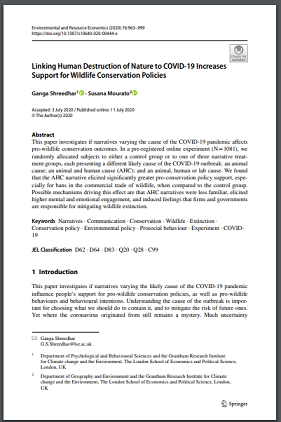
This paper investigates if narratives varying the cause of the COVID-19 pandemic affects pro-wildlife conservation outcomes. In a pre-registered online experiment (N=1081), we randomly allocated subjects to either a control group or to one of three narrative treatment groups, each presenting a different likely cause of the COVID-19 outbreak: an animal cause; an animal and human cause (AHC); and an animal, human or lab cause. We found that the AHC narrative elicited significantly greater pro-conservation policy support, especially for bans in the commercial trade of wildlife, when compared to the control group. Possible mechanisms driving this effect are that AHC narratives were less familiar, elicited higher mental and emotional engagement, and induced feelings that firms and governments are responsible for mitigating wildlife extinction.














